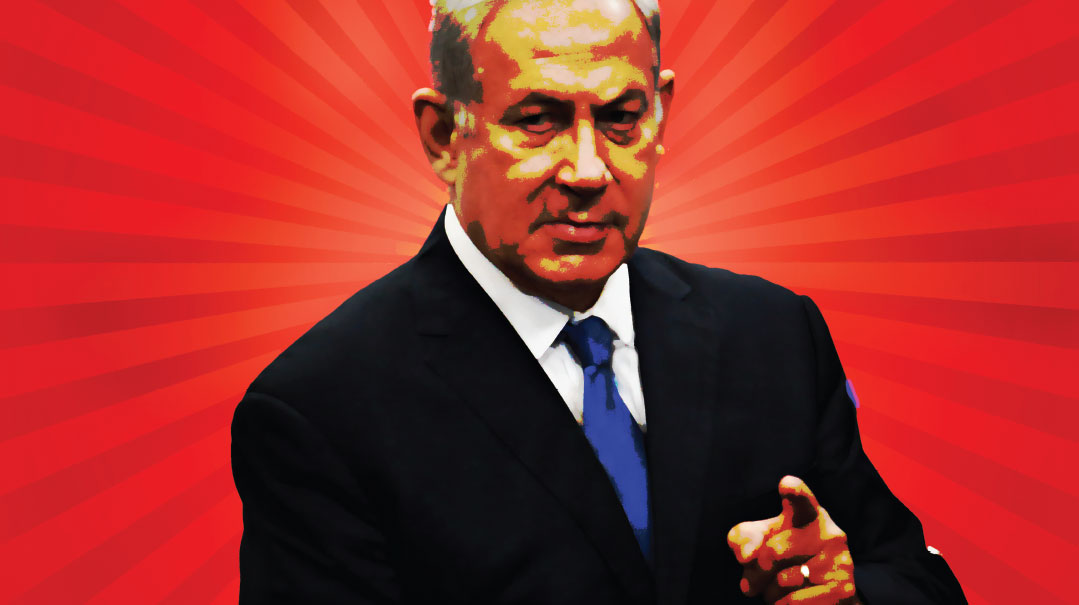Bibi’s Last Stand

Bibi’s desperately rolling the dice for his political survival

The best way to understand Israeli politics nowadays is to think of the Knesset like the northern border with Hezbollah. One moment there’s a tense quiet as the two sides probe each other’s weak points, on guard against attack. Suddenly there’s a provocation, reports that hostilities are imminent, and the media swoop. Just as suddenly, it blows over. Calm resumes and the headlines move on.
Political border raiding is more or less how Israel began the week. The two-headed Hydra government of Netanyahu and Gantz - a coalition that has never coalesced - threatened to tear itself apart and take the country to the voting booths again.
The immediate flashpoint was a tussle between the co-prime ministers about whether to pass a one- or two-year budget – and if there’s no approved budget, there’s no government (the budget is often the easiest way to topple an incumbent government). Building for weeks, the crisis came to a head on Sunday with a tense standoff at the weekly cabinet meeting. “From day one, you didn’t intend to honor the coalition agreement and pass a biannual budget,” Gantz reportedly shouted at Bibi, to which Netanyahu responded: “Can someone turn up the volume? We don’t hear you.”
With the Knesset on war footing, and the media full of reports of politicians considering new alliances, Israelis – in the depth of an economic and health crisis -- wearily looked on as the country teetered on the edge of fourth elections.
And then the crisis seemed to blow over. A bill proposed by Communications Minister Yoaz Hendel moving the August 25th budget deadline a few months down the line drew Netanyahu’s support on Monday, and the coalition looked like it might survive to fight another day.
But this may only be a reprieve, a temporary ceasefire. “He’s only agreed to support the bill in its initial reading and there’s no guarantee that it will pass,” said Degel HaTorah chairman MK Yitzchok Pindrus. “Even if it does, that only gives another hundred days to decide on a budget, and then what?”
The current impasse was memorably summed up by Likud chairman Miki Zohar. “There is a chasm between us and Blue and White on many issues and we are not really able to function as a good coalition,” he said. “It’s like a couple who want a divorce, and feel that anytime now they’re going to the rabbinate and signing a get.”
In this brinksmanship lies the strange duality of Netanyahu’s twelfth consecutive year in power. With a legal system relentlessly closing its steel jaws around him, and hampered by the awkward political shidduch forced on him by three inconclusive elections, Bibi looks simultaneously weak and strong.
His Likud colleagues are too cowed to challenge him; the chareidi parties have no alternative even if he threatens fourth elections; and he’s betting that even Naftali Bennett wouldn’t support a left-wing government.
And so, after being accused for years by the left of running the country for his own benefit, Bibi risks staining his legacy at the eleventh hour by pulling the country to more elections for what looks suspiciously like his own personal needs.
“Shimshon the Nebach,” is what Levi Eshkol, a previous occupant of the prime ministerial office, named his country for its combination of strength and fragility.
Hanging on to power despite three rounds of elections, and exuding a similar blend of invincibility and political mortality, Eshkol could have been referring to Bibi himself.
For the love of money
No one argues that a country fighting a savage economic downturn needs a stable economic policy and a budget. It’s just that Israel’s politicians can’t agree what that budget should look like.
The coalition agreement signed by Likud and Blue and White back in April couldn’t have been clearer. It stipulated that the new government would pass a two-year budget, effectively for the balance of 2020 and 2021, enabling a modicum of medium-term planning for ministries and bureaucrats.
But the wheels rapidly came off that plan. By July, Netanyahu was demanding a change to the coalition agreement to pass a one-year budget. Israel, he claimed, is in too great a financial emergency to afford a lengthy two-year budget debate and needs an immediate short-term budget.
But Gantz smelled a giant rat. The economic situation in April, when the coalition agreement was signed, was already catastrophic. What had changed by July? With their prime ministerial rotation agreement sealed in law, and a clause saying that whoever toppled the government would forfeit the keys to the prime minister’s office for the duration of the campaign, the only remaining off-ramp for Netanyahu was the budget. If it fails to pass, the country automatically goes to the polls – with Bibi still in office. By acceding to a one-year budget, Gantz would be handing Netanyahu another loaded gun to take him down before the rotation agreement comes into effect next year.
Degel HaTorah MK Yitzchok Pindrus agrees with that assessment. “Bibi is doing everything he can to bring this coalition down. He feels it’s the end of the road for him politically because of his court cases, and he won’t hand over power to Gantz.”
And so it’s come down to the wire on this budget issue, with coalition members split over the utility of kicking the can down the road.
Communications Minister Yoaz Hendel noted in response to the Likud’s support for the law: “The bill will go up for a preliminary reading in the plenum today, which is welcome progress to prevent the madness of going to fourth elections in the midst of an unprecedented economic and health crisis.”
But Knesset Finance Committee chairman Moshe Gafni told Mishpacha that he was opposed to the bill.
“We oppose the election, but postponing the budget deadline means we are completely paralyzing the country. The middle class and the socio-economically weak will suffer from it. We are playing with human life. Currently budgets are being brought to the Finance Committee, including a four-billion-shekel bill for education in corona. This proposed delay means that that any current bills would be frozen.”
Clearly, Netanyahu’s softening on the budget issue has everything to do with avoiding at all costs being the one left carrying the baby of toppling the government. A senior Likud official clarified that “as promised, Prime Minister Netanyahu is doing everything to avoid elections and reach a solution that will allow the government to continue working and make the necessary decisions to fight the coronavirus, including transferring billions of shekels to aid Israeli citizens.
“The Likud believes in an immediate budget to help citizens and businesses emerge from the crisis,” he added. “We agreed to accede to the Derech Eretz faction’s request to give a last chance for compromise. This is not the time for politics, this is the time for unity and fighting corona and this is what the prime minister is doing.”
But Coalition chairman Mickey Zohar made clear that Likud’s flexibility was limited: “We will negotiate with Blue and White, and as soon as we reach an understanding, we will pass the bill to postpone the budget on second and third reading. But we insist on an annual, as opposed to a two-year, budget.”
Why Risk It?
In his twelfth year of consecutive office, and his sixteenth year as prime minister overall, Bibi has had more political lives than the proverbial cat. He’s also built a justified reputation for a mastery of polling. Which leaves a huge question mark: Why would he be pulling toward elections in the current circumstances?
With Israel’s disastrous second coronavirus wave, the latest Maariv-Geocartografia poll shows Likud taking just 29 seats, and bleeding support to Naftali Bennett’s Yemina, with Gantz’s Blue and White losing ground to a resurgent Yesh Atid headed by Yair Lapid. With numbers like this, Likud would have no path to forming another coalition — except through Yemina, who have not guaranteed they will back Netanyahu.
Polls aren’t Bibi’s only worry. His court case, due to resume in earnest in January, weighs heavily on his mind, even as he’s accused the justice system of selective investigation in order to topple him from power.
It’s something that many on the right and in the chareidi world believe as well. In a conversation with Mishpacha last year, Degel HaTorah MK Uri Maklev supported that claim, saying that the left was trying to achieve via the legal system what they couldn’t at the ballot box.
Yet the chareidim, Bibi’s loyal partners for years, have fought hardest against elections, because a drop in their clout leaves the yeshivah system – which is not funded automatically like the state education system – foundering. “It’s a disaster both for the country and for the chareidi community,” said Pindrus. “There is no budget for the entire education system.”
Even the constant reports of Blue and White ministers being offered plum jobs in exchange for jumping ship don’t sound convincing. “Bennett, Shaked and Hendel – they won’t join Bibi,” says Pindrus.
And as a former chief of staff with control of Israel’s nuclear codes, Gantz holds a nuclear option of his own. It’s Yair Lapid’s favorite law, barring someone who’s been indicted – meaning explicitly Bibi – from standing as prime minister. While Yair Lapid wants to move that legislation forward, Gantz has so far blocked it. But if Bibi goes for broke, Gantz could vote to bar him from running.
So weakened as he is, why is Bibi agitating for elections? Why would he attempt to rock the boat?
A Frozen Map
For an answer, just take a look at Israel’s political map, and the deep freeze of the right and left blocs. Start with the chareidim: Bibi knows full well that they have no option of being in government without him, and no option to sit in opposition while Lapid and Avigdor Lieberman run amok with Israel’s religious status quo and slash yeshivah budgets.
Shas leader Aryeh Deri’s electoral strategy is built on a bearhug for Bibi. He ran successive campaigns depicting himself with Netanyahu, emblazoned with the play-on-words: “Bibi needs a strong Aryeh”, a reference to Deri’s leonine name.
And Deri himself told Mishpacha that with many of his voters diehard Bibi-ists, Shas has no room for maneuver saying, “If I go with Gantz they won’t vote for Shas.”
Even in Likud’s internal politics, Bibi must know that he has sufficient control of his base to ward off a coup. As Ziva, a Likud voter from Beit Shemesh, a Bibi stronghold, told me, “Bibi doesn’t want elections. And anyway, who is this Gantz? He’s not fit to be prime minister. Let him agree to a one-year budget!”
Bibi’s rock-solid base, coupled with the instructive example of Likud heavyweight Gidon Saar’s painful loss when he challenged Bibi in December’s primary, ought to be enough to deter any internal insurrections.
And as for Naftali Bennett, he remains a riddle. Given his repeated political humiliations at Bibi’s hands, he must be tempted to unseat the man who he once worked for as head of the prime minister’s bureau. But would he move to unseat Bibi by ushering in a left-wing government? Bibi must be hoping not.
Twilight
So what will Bibi do next?
It’s a question that has provided endless grist for the Bibi analysis mills over the years, and only a very brave soul would count the old survivor out.
But one thing seems certain: between COVID-19, Bibi’s legal cases and the effects of political shelf-life, it’s not hard to see that Netanyahu’s in his political twilight.
Outside his official Balfour Street residence over the last few weeks have been sizable crowds of demonstrators from the “Black Flags” movement, dedicated to seeing Bibi step down for corruption. He’s seen off far bigger protests – notably the 2011 “cottage cheese” protests in Tel Aviv – and he’s resorted to dismissing them as left-wing anarchists.
But Israelis are used to seeing Bibi as “Mr Security” – whose sonorous tones and commanding presence are hallmarks of his leadership. But the government’s disastrous handling of the second coronavirus wave and the widespread frustration at the handling of the financial shocks has put Netnayahu on the back foot.
And that new sense of being vulnerable explains his political playbook. Bibi is an opportunistic ideologue, as the now dead-and-buried annexation saga shows. If there was an easy win to be had by applying sovereignty to parts of the West Bank, Netanyahu would have gone for it. He stoked media expectation, and then quietly dropped it when the American political window closed.
Bibi’s not one to die on every ideological hill; he plays the long game.
So Netanyahu probes, pushes for elections and waits for the polls, and then backs off. He balances his strengths and weaknesses, his political clout with his vulnerability.
But cornered by a justice system and unwilling to be forced out of office, Bibi might feel that he has no choice but to roll the dice even when the odds are stacked against him.
“It’s tamus nafshi im pelishtim,” says Yitzchok Pindrus, “and he’s going to try.”
(Originally featured in Mishpacha, Issue 823)
Oops! We could not locate your form.













